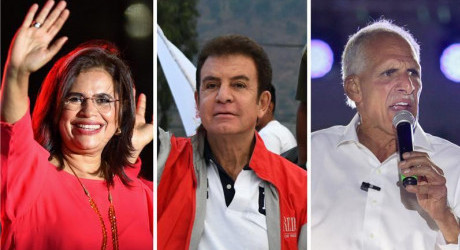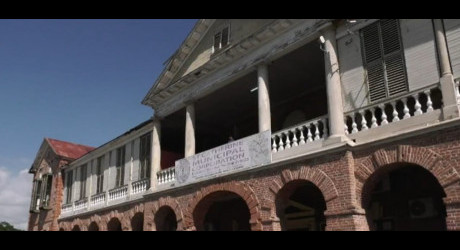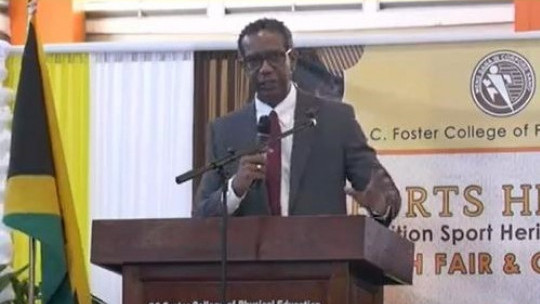Time to end the state of entropy
7:35 am, Sat January 27, 2024
Below is the slightly edited text of the address delivered by Dr. Nelson Christian Stokes, PhD, Development Economist, Sport Administrator and Chairman NCS Enterpriseson Thursday at the 4th Sports Heritage Symposium staged by G. C. Foster College of Physical Education & Sport
As we shed our post-colonial notions of education, opportunity and achievement, and begin to embrace ourselves and to see our own values and to understand that culturally and in sport, others wish to be like us, more than we want to be like them, it is my hope that collectively we embrace sport as part of our national character, and give credence to the pursuit of sport whether as an athlete, coach, teacher, researcher, administrator, or investor, with the respect that it deserves from ourselves and that is so freely given by others outside of Jamaica. We must at last embrace the value of what the late Jamaican sports journalist Raymond Sharpe called “the potency and potential of Jamaican athleticism.”
In this new paradigm of national self-acceptance, the GC Foster College of Physical Education and Sport must now move from the periphery and towards the seeded lanes of choice for our young men and women as preparation for a career in sport.
Symposia such as this are an important cornerstone in achieving such a preferred position of choice. Respect after all is earned, not bestowed. Again, a tip of the hat to the College for this initiative is in order.
I will divide my talk today into two separate but related categories. I will first share my thoughts on the major theme of the symposium; Unleashing the Potential: Physical Education, Sport, Health, and Wellness for Sustainable Development, then I will turn my attention to "The Role of Policy and Governance in Physical Education and Sport"
National Development Generally
There are any number of ways to think of development and sustainable development. The World Bank looks at development under 6 measures:
- Poverty and inequality
- People – education, health, nutrition, mortality etc.
- Environment – use and protection of the environment and natural resources.
- Economy – macroeconomic measures such as GDP, balance of payments and inflation.
- States and Markets – financial markets, transportation system, and the spread of technologies, and
- Global Links – trade, remittances, tourism and migration
Economic Development
I will focus on economic development which betrays my conviction that it is, at the end of the day, the quality of choices that we make in the allocation of scarce resources amongst multiple demands that has determined our present and will determine our future.
Without getting too precise, there are three main drivers of economic development:
- The accumulation of capital stock
- Increases in labor input and productivity
- Technological advancement
The accumulation of capital stock, and technological advancement as things now stand, depend to a large extent on attracting foreign direct investment and technology transfer from other domains. It is in the area of increases in labour output, or human capital development that we here, without outside support, are in a position to directly and meaningfully impact. After all, education is central to human capital development in any economy. This college has a role to play in unleashing this potential.
To be sure, there are material headwinds. Let me mention here, three:
- The horse starving while the grass is growing, meaning to say, education is important to economic development both at the national macro level and at the individual micro level. Yet the ability to cover the costs of this education is inhibited by the same dire economic circumstances it is intended to solve. Put plainly, students cannot afford to pay, in viable numbers, what the college would need to charge to operate properly and fulfil its mission.
- The general level of education in the country. Professor Orlando Patterson has added his highly regarded voice to the calls for reshaping Jamaica’s educational system while detailing its sorry state in his role as Chair of the ‘Jamaica Education Transformation Commission’. The report lays bare before us the bane of the malaise which deeply infests our educational system, and which is a ghastly dereliction of duty on the part of the state, and borders on child abuse. I understand why our slave masters would not want to teach us to read and write and do sums. Why do we do the same? Nothing is wrong with our children, given the opportunity they can learn and learn very well. The country has failed them. I am reminded of Shakespeare’s play Julius Caesar where Cassius admonishes Brutus……’The fault dear Brutus is not in the stars, but in ourselves.’
- The labour market. The fact that 700,000 Jamaicans, able to work, remain outside the labour force, even as there are growing calls for the importation of labour requires understanding and intervention of its own. It is related to the level of small business and hustler entrepreneurship in our economy, but I would not want to explore that fully here. My immediate concerns are the trends in population. The birthrate in Jamaica has declined every year from 2020 through 2023. Perhaps longer. Taken to the limit, there will be nobody left living in Jamaica. This problem is not unique to us. Current estimates suggest that at its current birth rate the Chinese population will halved by the year 2100. Many factors drive this trend which is only compounded by the persistent migration of our trained persons.
For the strategy of driving growth with human capital development to work we must have persons, and persons who are educated, willing to work and who live in Jamaica. What does this mean for us.
What lies clearly at hand
Let me share, at risk of boring many here, the story of the starfish on the beach. The story goes that two friends are walking on a beach one morning. Unlike other mornings when they immersed themselves in the sound of the waves and the feel of the sand beneath their feet, this time, they were set aghast to see the beach covered in starfish, washed up by mysterious biological processes. The beach was littered in starfish but the friends walked anyway finding a clearing of sand for their next step where each could. Without warning, one friend started to take up starfish, one at a time and throw them back in the water. Overcome with incredulity and a sense of futility, the other friend asked, ‘Why are you doing that?’, ‘It’s a waste of time. You can’t save them all. Let’s just enjoy the walk. What you are doing will not make a difference.’ At which point his determined friend took up another starfish, showed it to his bemused companion, threw the creature back in the water and said ‘It made a difference to that one.’
We here cannot save all but we can save one, and then another, and another. GC Foster, it’s administrators and teachers can do that. To quote Thomas Carlyle ……. ‘Our main task is not to see what lies dimly at a distance but to do what lies clearly at hand.’
Among the things which lie clearly at hand is the need to develop a wider range of economically viable pathways for students. We can prepare coaches and we can prepare teachers. Those can always be improved but our ability to deliver in those spheres is well and clearly established. What I would want to encourage, is a rethink around the business models of sports associations and teams. We are familiar with coaches and teachers being paid as a job, and coaches and administrators being paid from earnings from their athletes particularly in track and field. There are two approaches I am involved with now, which are of interest to me and which I trust will stimulate some thought, discussion and development.
First, as a director of the Mount Pleasant Academy, I believe the initiative to develop a business model around the education, football development, exposure and sale of players at scale, informed by what we have seen with Bibby Gardner at Harbour View as a young player, and through the Phoenix academy, as a few examples, is a good thing for the country that needs to be embraced and replicated. There are many business problems to be solved in this model. How do you choose players to invest in? How do you fund the investment? How to you treat players who don’t get professional contracts? What are appropriate legal arrangements for minors especially as it regards locking in any future return on an investment? Graduates from this institution should be wrestling with issues of this nature.
Second, the 2034 Olympic Winter Games will be in Park City, Utah, one of the home tracks of the Jamaica Bobsleigh Team in a sport where familiarity with the track yields big dividends as we have seen again in the recently concluded Youth Olympic Winter Games. As the Jamaica Bobsleigh and Skeleton Federation is detailing a plan for a podium finish in 2034, interesting options have come up when considering how to fund the endeavor. A basic program for our bobsleigh team costs about $250,000 for the season, which we fund largely from sponsorships. A medal push skyrockets that figure to $1.5-2 million annually over a minimum of eight years. There are few sports associations that can raise $250,000 annually and precious few, maybe one or two that can raise $1.5-2 million annually. This is an interesting problem for young minds to apply themselves to. By way of hint, the answer does not lie in a stretched hand to the government or the SDF. Innovative structures must be developed. One such structure I am in discussions over is a venture capital model where investors in the 2034 plan would retain rights to monetizing opportunities created from a podium finish. The structure is not complex, but the details are many, and willing investors are few.
I do not present these ideas as solutions but as approaches to consider and as an impetus to bringing the full power of the nation’s sport intellect to bear on addressing challenging sports business problems, often with no proven playbook for resolution, that is to say, we have to create our own solutions. My challenge is for students in these halls to take the lead on this.
Policy and Governance
In business terms, policy is closely related to strategy. Strategy may be either intended or emergent. I put it to you that the incredible successes we have seen in Jamaican sport – not just track and field and football, but hockey, gymnastics, aquatic sports, netball, rugby, lacrosse, volleyball and of course bobsleigh to name a few is more emergent than derived from a top-down policy position. This success is built on the backs of and concretized with the sweat of vast numbers of volunteers operating locally in their communities out of love for their sport. The country’s success is from the bottom up, not from the top down. This is not a criticism. Individuals acting in their own self-interest or what interests them is a much more productive and efficient economic model than grand central plans passed down in thick binders.
The Gleaner of January 10, 2024 carried an article entitled Grand Cost of Gala in which Dr Sonjah Stanley Niaah, cultural studies lecturer at The University of the West Indies made a point in culture which is equally applicable in sport.
She said Jamaica, as a country with relatively few resources invested in cultural work, cultural preservation, cultural infrastructure and cultural events, is globally recognised as a cultural superpower.
Stanley Niaah said with relatively low investment in culture, this status was achieved on the backs of ordinary Jamaicans who have been the vessels carrying cultural assets and memories for generations.
While I laud the volunteer spirit, I would also like to stress the importance of professionalizing sport administration. The idea, for example, of a General Secretary being paid and paid well, and held to delivering results, should not be offensive and should be another viable pathway for graduates of this institution. Volunteering is essential to existence, put professionalism is essential to excellence.
I hoped to myself that, as we received visits from Trinidad and Tobago officials, keen on learning the policy and planning structures that have driven Jamaica’s sporting success, that someone would be gracious enough to point out to them that the secret sauce is in a national psyche chiseled from our experiences where from Norman Manley, -Wint, Mckenley, Rhoden and Kerr- GC Foster the man himself, to current high performers, there has never been daylight between sporting success and national identify for a Jamaican. Our minds and sense of our self are different are unique. And when that different mind is taken to a widely practiced task, the results will be consistently be outstanding. While we can learn from each other, we must each do the hard work of finding our own path based on our own minds.
Having said that, I believe that policy at the government level and good governance at the organization level are important to becoming our best. As it relates to government policy, an updated national sports policy and updating of the Vision 2030 Sport Sector Plan are overdue. I would also suggest that the National Sports Council be revisited and work with both the vision and policy implementation to add intentional action to organic effort.
Elections
Let me now move from policy to good governance at the sporting level it is a talk all by itself. But prompted by the JFF elections, or lack of elections, let me suggest some basic principles. Before I go further allow me to point out that Jamaica has had a long if checkered history as a liberal democracy featuring elections and the peaceful transfer of state power. This should not be taken for granted as we have seen in the US. We may be duly proud of this. Not every election was seen as free and fair giving rise to an agreement between political parties that saw the establishment of the Electoral Commission of Jamaica in 2006 from its predecessor, the Electoral Advisory Committee which was formed in 1979. The Electoral Commission describes itself as a ‘permanent independent and autonomous authority that reports directly to Parliament.’; with the objective of safeguarding ‘the democratic foundations of Jamaica by enabling eligible electors to elect, through free and fair elections, their representatives to govern Jamaica.’ This commission has worked well which is not to say perfectly.
I have been in a few sport body elections in Jamaica. Some I have lost and been disheartened and others I have lost and with a grateful heart marveling at God's wisdom in sparing me victory. What I am about to suggest comes from extensive experience in sports politics and having witnessed and experienced first-hand the malignant infestation of our most noble institutions. We need to do better.
Fortunately, the modus operandi of the ECJ provides a good though outsized model of how we should organize ourselves to conduct fair elections in sporting bodies in Jamaica. Electioneering is combat. It is difficult and it brings out the worst in men. A good system of elections should not seek to instill morals, that is out of scope, but rather to establish basic rules to which all must adhere despite personal immorality. Notwithstanding, the calls for more civil public discourse by former Prime Minister PJ Patterson, and current Prime Minister Andrew Holness should reverberate in the campaign meeting rooms of our sporting leadership candidates.
Here are some basic rules we should be able to agree on:
- The body overlooking an election should be actually independent and without interest or the appearance of interest in the success or failure of candidates.
- The voting list should be finalized by the body responsible for overseeing the election based on the applicable sections of the body’s statutes. Challenges should be heard and considered by this independent body which will have the responsibility of making a decision based on the constitution as approved by a general assembly.
- Persons standing for election should not, de facto, be running the election. This may lead to all manner of evil, such as, for example, candidates being nominated after the close of nominations to suit some agenda.
- The stacking of voters’ lists, in its many and varied forms, should be prohibited in statute and spirit. We should not have associations with neither athlete nor program voting. We should not be creating and manning organizations and imbuing them with the franchise in the interest of securing that vote.
- Proxy votes, where applicable, should be carried by a representative of the voting organization, selected by a pre-determined process, and not turned over to either a sitting candidate or challenger or allies of same.
One could go on and on but would be satisfied with these basic standards.
The question then arises as to who this independent body to oversee sporting association elections should be. This could be addressed in each individual constitution and implemented as long as the standards of independence are met. Perhaps a national office of the nature of ECJ could be established and convened as necessary. This would have to be independent of local political influence as international sporting bodies guard their jurisdictions jealously. Would a National Sports Council, independent and autonomous, be able to take on that role. I encourage you here to apply you minds to these issues as well. My preference is a body a la the ECJ being responsible for overseeing the election process in sporting organizations. The state of entropy must be stabilized and improved.
The challenges are many but not beyond the capacity of those at this conference to adequately address.

7:56 pm, Mon December 1, 2025

7:17 pm, Fri December 5, 2025

3:07 pm, Wed December 3, 2025








 All feeds
All feeds







